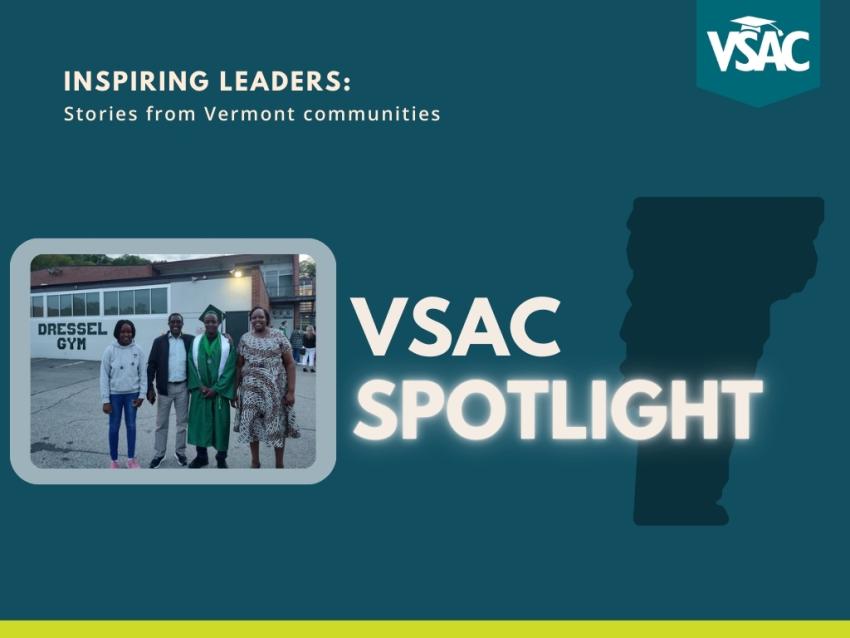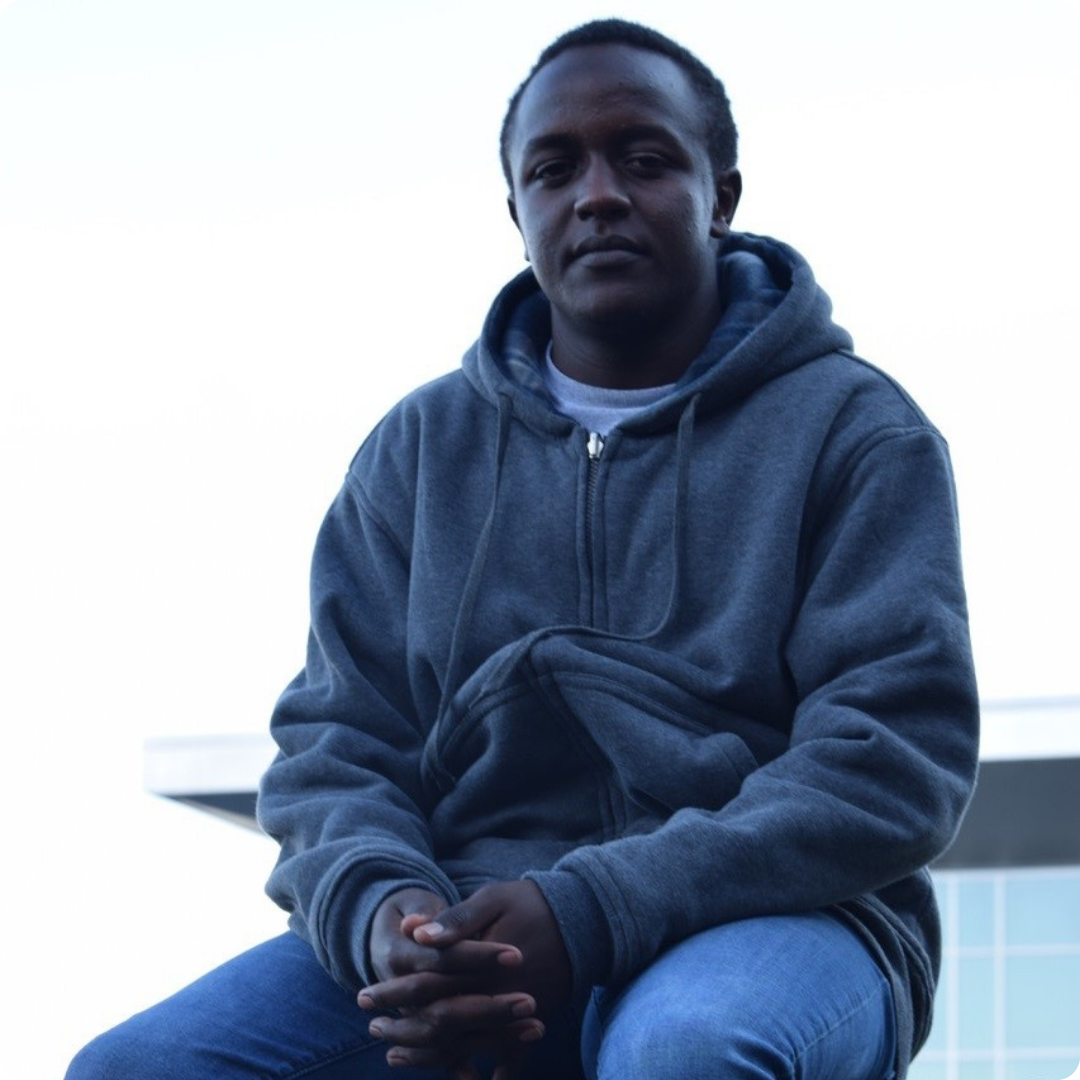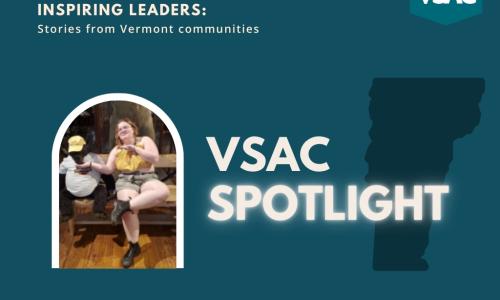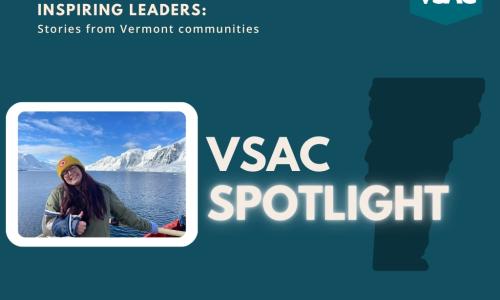Planning for college or training this year? Apply for the Vermont Grant.
For Amon Chumba, absorbing American culture included understanding college admissions

When Amon Chumba emigrated to the US from Kenya at age 17, he found that American food was much blander than what he was used to, while the sports—wrestling, snowboarding and football—were more exciting. (Soccer was his previous favorite.) And when it came to college applications, the American system was far more complicated.
Amon, who just finished his first year as a biology major at UMass Dartmouth, moved from Kenya to Springfield, Vermont, in the summer of 2022, just before his senior year of high school. While the timing was difficult, and he considered staying behind to graduate from his boarding school in Kenya, he would have been separated from his family. Also, looking back, Amon thinks the move was an advantage when it came time to apply to college—thanks to the help he received from his school guidance counselor, Michelle Pinter-Petrillo at Springfield High School, and his VSAC GEAR UP outreach counselor, Jessi Krause Herron.
“If I would have finished high school in Kenya, I probably wouldn’t have gotten help from VSAC, or known which schools to apply to or how to apply. I feel like I learned a lot finishing high school here,” Amon says.
He notes that the American higher education system is much different than what he was familiar with. “It took me some time to adjust to the system here, and Jessi and Michelle helped me a lot.”
Herron says Amon was referred to her group of college-bound students in the GEAR UP program soon after the start of the school year.
His school counselor immediately recognized his hard work, his involvement in classes and extracurriculars, and his academic potential, and she referred him to me. From the moment he joined GEAR UP, he wanted to learn as much as possible about his options and how to make smart financial decisions about his education.
Navigating college admissions
VSAC’s GEAR UP college and career readiness program embeds counselors in eligible Vermont middle and high schools to help students prepare for, and pursue, higher education and training. Outreach counselors like Herron help students research schools, prepare college applications, and understand the complicated landscape of college financial aid.

In Kenya, Amon explains, applying to college is more straightforward. Toward the end of your senior year, you receive a list of colleges you’re eligible to attend, based on your grades. Then, after graduation, all seniors take a national final exam, and you choose 10 or 12 schools from that list to receive your test scores. And for Kenyan students, the college selection and admissions process doesn’t really begin until after high school graduation, which threw Amon off a bit.
“In November, Jessi and Michelle talked to me about applying to college. It seemed so soon, and I didn’t think I had enough credits,” he recalls. “I wondered, am I really ready? I didn’t want to go into something I wasn’t ready for.”
At first, he thought he’d wait a year and take some additional courses before applying to college. But Amon—who wants to go to medical school and aspires to become an orthopedic surgeon—then realized that plan would delay what was already going to be an educational journey of many years. “So, in January, I decided to start researching colleges.”
College applications, financing, and acceptance
With application deadlines looming (and some already past), Amon realized he needed to get going ASAP. “I didn’t have anything I needed. The teachers really helped me. My science teacher and my advisor wrote me letters of recommendation without my even having to ask.” Herron helped him find schools that met his criteria—offering a location close to home and a major in chemistry, biochemistry or biology—to help narrow down his list. After going on a tour of some of the UMass campuses, Amon applied to UMass Dartmouth and got his acceptance letter two weeks before graduation.
Then came the second question: finances.
Once again, the system seemed complicated, with requirements that were hard to meet for a very new American family. “We had only been here for a year, so we didn’t have prior-year tax forms for the FAFSA. I remember it gave us a headache,” Amon recalls. “I had several meetings with Jessi when it came time to fill it out.” While his FAFSA application was ultimately accepted, some schools still considered Amon an international student because of the limited financial information from his mom and dad, who work as a nurse and a welder.
“One of the bigger worries we had was, would we be able to pay?” Amon recalls.
Fortunately, Amon qualified for the New England tuition rate at UMass, which is less than out-of-state tuition, though still a bit more than for Massachusetts residents. “That helped a lot. After they applied that rate, UMass had one of the lowest costs.”
Amon was also diligent about scholarships. “He applied for every scholarship he was eligible for and deservedly earned six of them,” says Herron.
Adapting to new academic challenges
When it comes to academics, Amon acknowledges he’s a high achiever. “I’m someone who wants to do really well on every test,” he says, which has been a challenge, especially while adjusting to curriculum differences between Kenya and the US, and then from high school to college. At Springfield High School, for instance, he was surprised to find that math was separated into specific disciplines—algebra, geometry, calculus and statistics—while in Kenya, he says, “it’s just math!” The same was true in science, which made classes easier than he was used to. “It felt simpler here, so I started relaxing and didn’t study as much.”
He realized that had to change when he got to college. Getting a B on his first biology exam, he says, “was a warning that I needed to study harder.” He discovered that the library was a quieter place to work than his dorm, and he started going to professors’ office hours and tutoring sessions. Amon ended up with an A on the final exam. “I figured out a good schedule and studied throughout the term,” he says. “I realized I can’t leave studying to the last minute.”
Herron observes that Amon’s conscientious nature extends beyond the classroom. “He puts 100% into everything he does. He even texted me to wish me a Happy Thanksgiving AFTER he graduated from high school and went away to college,” she says. “Amon is one of the hardest-working, kindest and most conscientious students I have ever had the pleasure of working with.”






